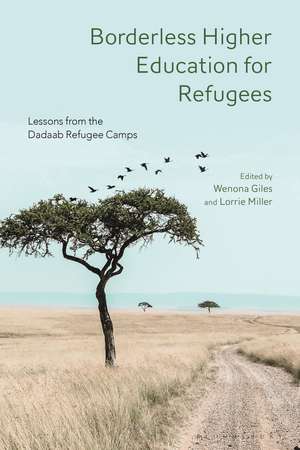Borderless Higher Education for Refugees: Lessons from the Dadaab Refugee Camps
Editat de Wenona Giles, Lorrie Milleren Limba Engleză Paperback – 22 sep 2021
| Toate formatele și edițiile | Preț | Express |
|---|---|---|
| Paperback (1) | 179.75 lei 3-5 săpt. | +45.84 lei 7-13 zile |
| Bloomsbury Publishing – 22 sep 2021 | 179.75 lei 3-5 săpt. | +45.84 lei 7-13 zile |
| Hardback (1) | 399.05 lei 3-5 săpt. | +27.96 lei 7-13 zile |
| Bloomsbury Publishing – 3 noi 2021 | 399.05 lei 3-5 săpt. | +27.96 lei 7-13 zile |
Preț: 179.75 lei
Preț vechi: 208.18 lei
-14% Nou
Puncte Express: 270
Preț estimativ în valută:
34.40€ • 35.71$ • 28.68£
34.40€ • 35.71$ • 28.68£
Carte disponibilă
Livrare economică 01-15 martie
Livrare express 15-21 februarie pentru 55.83 lei
Preluare comenzi: 021 569.72.76
Specificații
ISBN-13: 9781350151239
ISBN-10: 1350151238
Pagini: 248
Dimensiuni: 156 x 234 x 18 mm
Greutate: 0.4 kg
Editura: Bloomsbury Publishing
Colecția Bloomsbury Academic
Locul publicării:London, United Kingdom
ISBN-10: 1350151238
Pagini: 248
Dimensiuni: 156 x 234 x 18 mm
Greutate: 0.4 kg
Editura: Bloomsbury Publishing
Colecția Bloomsbury Academic
Locul publicării:London, United Kingdom
Caracteristici
Tells the unique story of the Borderless Higher Education for Refugees project which delivers tuition-free higher education into two of the largest protracted refugee camps in the world, Dadaab and Kakuma in Kenya
Notă biografică
Wenona Giles, PhD, FRSC is Professor Emerita and Senior Scholar in the Anthropology Department and Resident Research Associate at the Centre for Refugee Studies, York University, Canada, where she has taught and published in the areas of gender, forced migration, globalization, migration, education, nationalism and war. She co-founded and co-coordinated the International Women in Conflict Zones Research Network (1993-2004). She initiated and then co-led the a multi-year project (2013-2019) funded by the Canadian government and the Open Society Foundations that continues to bring degree programs from Kenyan and Canadian universities to refugees in the Dadaab refugee camps of Kenya (www.bher.org). Lorrie Miller, PhD is Associate Director for IVET - Institute for Veterans Education and Transition in the Faculty of Education at the University of British Columbia, Canada. Her work with IVET supports the development of a Veteran friendly Campus in a Canadian context and related academic programs for military related learners as they transition from active service to civilian life through university education. Questions surrounding pedagogies of care drive her academic curiosity. What does and should education look like in challenging times, in fragile contexts, with a cross-section of learners? Her recent position in teacher education at UBC, as a program coordinator in the B.Ed program and post-degree diplomas, involved working closely with the BHER project as a coordinator and student advisor for those visiting UBC students who studied in Dadaab and worked towards completion of their diploma in Secondary Teacher Education. In addition, she is a textile artist and instructor, where slow and Indigenous pedagogies are woven throughout her teaching, art, and writing.
Cuprins
Introduction, Wenona Giles, Lorrie Miller, Philemon Misoy, Norah Kariba, Okello Mark OyatPart I: Putting a Project into Action1. Historical and Political Contestations in the Dadaab Refugee Camps and North-Eastern Kenya, Mohamed Duale, Esther Munene, and Marangu Njogu 2. Gender Disparities in University Access in the Kenyan Kakuma Camps, Danielle Bishop, Hanan Duri, and Grace Nshimiyumukiza 3. The Challenges of Reciprocity and Relative Autonomy in North/South Partnerships, Josephine Gitome and Don Dippo 4. Development of a Community Health Education Degree Programme through a North-South Collaboration: Lessons Learned, F. Beryl Pilkington and Isabella I. MbaiPart II: Students and Teachers: Inside the BHER Supported Classroom 5. Refugees Respond: Using Digital Tools, Networks and 'Production Pedagogies' to Envision Possible Futures, Abdikadir Abikar, Abdullahi Aden, Kurt Thumlert, Negin Dahya, Jennifer Jenson6. Technology and Flexibility: The On-line Learning Experience of Teaching Assistants and their Students in the Dadaab Refugee Camps, Hawa Sabriye, Dacia Douhaibi, with contributions from Arte Dagane and Ochan Leomoi 7. Out of Bounds: The BHER Bones of Teaching Geography Across Borders, Megan Youdelis, Dacia Douhaibi, Devin Holterman, Kamal Paudel, Valerie Preston, Tarmo K. Remmel, Elizabeth Lunstrum, Joseph Mensah 8. Academic Philanthropy and Pedagogies of Resilience, Lorrie Miller, Graham Lea, Rita Irwin, Samson Nashon, Elizabeth Jordan, Kimberly Baker, Espen Stranger-Johannessen 9. Refugee Students' Experience of Accessing English Language Learning in Dadaab, Kenya, HaEun Kim, Nombuso Dlamini, Dahabo Ibrahim, Seraphin Kimonyo, and Johanna Reynolds 10. A Gallery to Rethink and Re-place the Anthropocene: Framing From A Place-based Borderless Higher Education, Steve Alsop and Roxanne CohenAfterword, Fouzia Warsame, the Dean of Education, Somali National University, MogadishuReferencesIndex
Recenzii
This book provides an honest and highly reflective account of the design and implementation of a higher education in emergencies project. The BHER story is told with a degree of humbleness and modesty regarding the inherently problematic initiative of a Northern/Western University to bring together a consortium/partnership with universities in the South and how it successfully navigated unequal power relations and neo-colonial patterns of thinking and acting.
